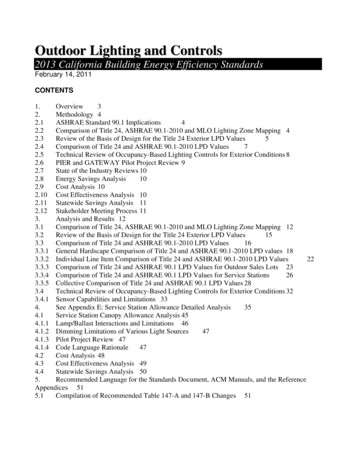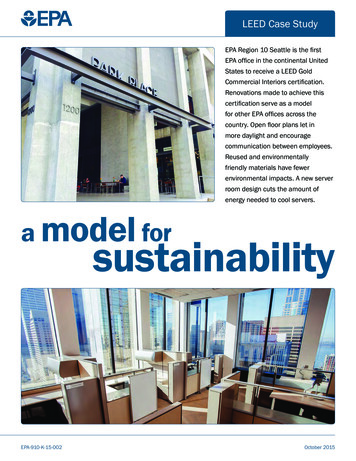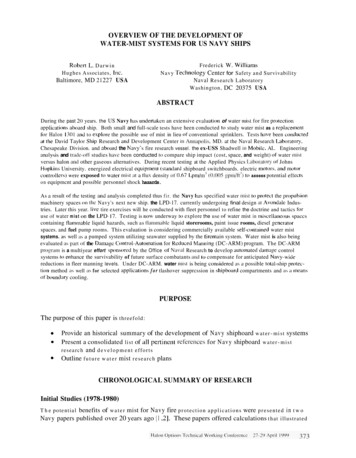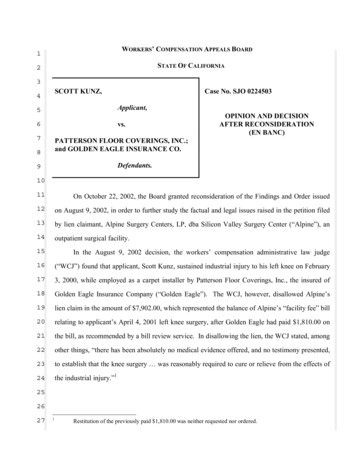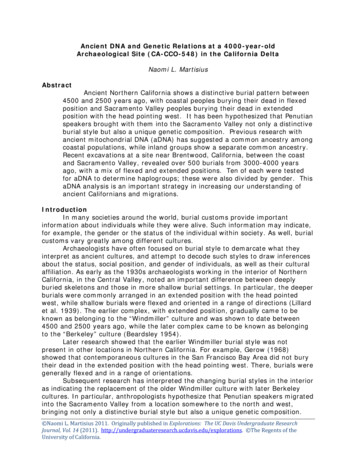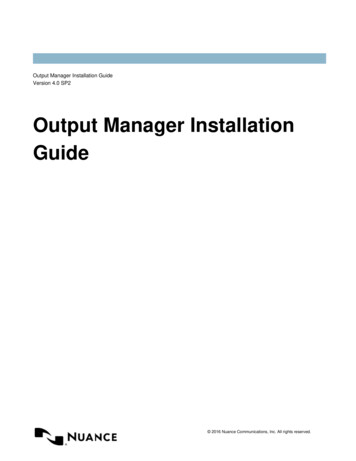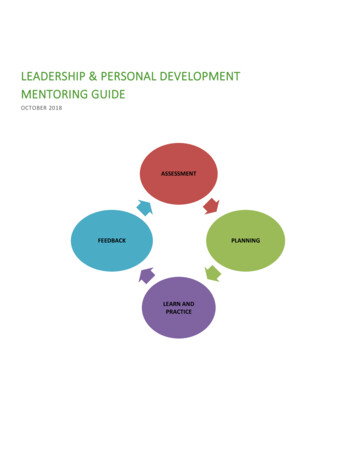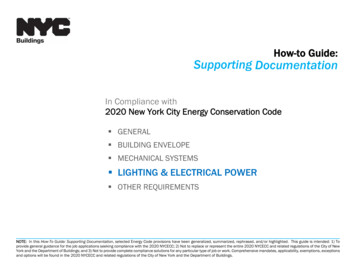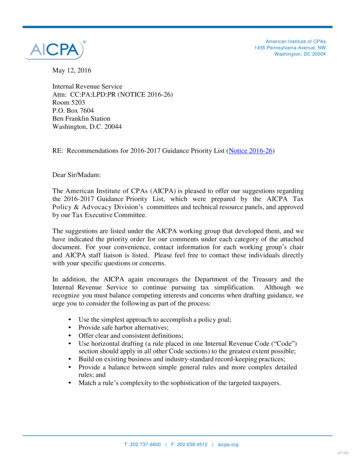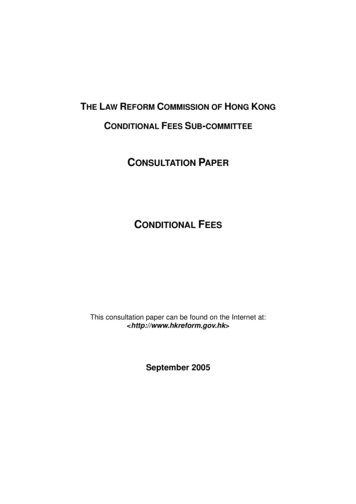
Transcription
THE LAW REFORM COMMISSION OF HONG KONGCONDITIONAL FEES SUB-COMMITTEECONSULTATION PAPERCONDITIONAL FEESThis consultation paper can be found on the Internet at: http://www.hkreform.gov.hk September 2005
This Consultation Paper has been prepared by the ConditionalFees Sub-committee of the Law Reform Commission. It does notrepresent the final views of either the Sub-committee or the LawReform Commission, and is circulated for comment and discussiononly.The Sub-committee would be grateful for comments on thisConsultation Paper by 15 November 2005. All correspondenceshould be addressed to:The SecretaryThe Conditional Fees Sub-committeeThe Law Reform Commission20th Floor, Harcourt House39 Gloucester RoadWanchaiHong KongTelephone: (852) 2528 0472Fax:(852) 2865 2902E-mail:hklrc@hkreform.gov.hkIt may be helpful for the Commission and the Sub-committee, eitherin discussion with others or in any subsequent report, to be able torefer to and attribute comments submitted in response to thisConsultation Paper. Any request to treat all or part of a responsein confidence will, of course, be respected, but if no such request ismade, the Commission will assume that the response is notintended to be confidential.It is the Commission’s usual practice to acknowledge by name inthe final report anyone who responds to a consultation paper. Ifyou do not wish such an acknowledgement, please say so in yourresponse.
THE LAW REFORM COMMISSIONOF HONG KONGSUB-COMMITTEE ONCONDITIONAL FEESCONSULTATION PAPERCONDITIONAL FEESCONTENTSChapterPagePreface1Terms of referenceThe Sub-committeeWhat are conditional fees?TerminologyContingency fee, percentage fee, “no win, no fee”Conditional fee, uplift fee, success feeSpeculative feeLayout of this paper112233331.5The costs of litigationWho pays for litigation?Relevant costs rules in Hong KongCosts to follow the event - the costs indemnity ruleBases of taxation in Hong KongCosts on the party and party basisCosts on the common fund basisCosts on the indemnity basisCosts as between a solicitor and his own clientCosts on the trustee basisOther costs aspectsCounsel’s feesCosts of litigant in personLegal aid as a source of finance for civil litigationThe merits testi57788899101010111111
The means testOrdinary Legal Aid SchemeSupplementary Legal Aid SchemeCriminal Legal AidProvisions against conditional or contingency feearrangements in Hong Kong12121314152.Contingency fee arrangements in the USA17IntroductionThe percentage contingency feeOther unique features of the American civil justice systemCosts do not follow the eventTrial by juryPunitive damagesSpecialised plaintiff barPrecedents not bindingDiscoveryAbsence of legal aidClass actionsNon-specific egislative changes in Englandconcerning conditional feesIntroductionMaintenance and champertyCriminal Law Act 1967Solicitors Act 1974The Royal Commission on Legal Services 1979Green Paper on Contingency Fees 1989Risk of conflict of interestThe United States experienceAccess to justiceAllowing the consumer to chooseOptions set out in the 1989 Green PaperResponses to the 1989 Green PaperCourts and Legal Services Act 1990Conditional Fee Agreements Regulations 1995 andConditional Fee Agreements Order 1995After-the-event insuranceCounsel’s feesEvaluation of conditional fee agreements in 1997Further reforms 1998 – 2000Consultation Paper on “Access to Justice withConditional Fees” 1998Conditional Fee Agreements Order 1998ii2424252727272828292929303031333636373838
3941424243Access to Justice Act 1999The Conditional Fee Agreements Regulations 2000General requirementsConditional fee agreements with a success feeInformation which must be given to a client beforemaking a conditional fee agreementCollective Conditional Fee Agreements Regulations 2000The Civil Procedure (Amendment No 4) Rules 2003 – Fixed costsConditional Fee Agreements (Miscellaneous Amendments)Regulations 2003Possible further legislative changesDCA Consultation Paper June 2003Conditional Fee Agreements Forum 2003DCA Consultation Paper June 2004The use of conditional fee agreements in EnglandThe future of conditional fee agreements4747484852534.55Problems and litigation in EnglandIntroductionLitigation on the recoverability of success fees and insurancepremiumsCallery v GrayThe jurisdiction issueThe prematurity issueCourt of Appeal decisionGovernment policyPolicy and practical considerationsThe House of Lords decisionReasonableness of the success feeCourt of Appeal decisionTwo-stage success feeHouse of Lords decisionReasonableness of the ATE premiumCourt of Appeal decisionHouse of Lords decisionComments on Callery v GrayHalloran v Delaney – from 20% success fee to 5%Comments on Halloran v DelaneyThe effect of BTE insurance on the recoverability of ATE premiumsSarwar v Alam – 2001Sarwar v Alam – 2003Re Claims Direct Test CasesThe position of event-triggered fees at common law andproblems with the costs indemnity ruleBritish Waterways Board v NormanThe indemnity rulePublic policyAratra Potato Co Ltd v Taylor Joynson 6566676769707171727274
Thai Trading Co v TaylorLegislation and rulesDifferentiating maintenance and champertyChanging public policyAbsence of implied contract as to costsConclusionBevan Ashford v Yeandle LtdPost Thai Trading Co and Bevan Ashford decisionsCases not following Thai Trading CoHughes v Kingston-upon-Hull City CouncilAwwad v Geraghty & CoClaims intermediariesEnglish v ClipsonThe scope of application of section 58 of the Court andLegal Services Act 1990R (Factortame Ltd) v Secretary of State for Transport,Local Government and the Regions (No 8)Hollins v RussellSpencer v WoodKing v Telegraph Group LtdAtack v Lee and Ellerton v HarrisSummary of main red fees in other jurisdictionsIntroductionAustralian jurisdictionsAustralian Law Reform Commission, Managing Justice –A review of the federal civil justice system 2000Magic Menu Systems Pty Ltd v AFA Facilitation Pty LtdSmits v RoachThe Attorney General’s Department –The Justice Statement 1995The Law Institute of Victoria, Funding Litigation:The Contingency Fee Option, July 1989Legal Practice Act 1996, VictoriaComments of the Law Institute of VictoriaLegal Profession Act 1987, New South WalesLegal expenses insurance in AustraliaGroup insuranceCanadian jurisdictionsOntarioJoint Committee’s proposed regulatory schemeIrelandMainland ChinaNorthern IrelandScotlandSouth 5106106108108108109109
6.Arguments for and against conditional feesand related issuesIntroductionLord Chancellor’s Department’s Green Paper onContingency Fees 1989South African Law Commission’s Report on Speculative andContingency Fees 1996Conclusions of the SALCContingency or conditional feesCriticisms of the American contingency feeFrivolous litigationConflict of interestExcessive feesAdvantages of conditional feesFrivolous litigationConflict of interestExcessive feesThe English Court of Appeal in Awwad v Geraghty & Co –pros and cons of conditional normal fee agreementsOther criticisms of conditional fee agreementsOther issues to be consideredCounselInsuranceIntermediariesRegulation of claims intermediaries in EnglandMode of operation of claims intermediaries in Hong KongRelevant regulations and rulesPros and consThe impact of allowing legal practitioners to chargeevent-triggered fees on claims intermediariesThe Hong Kong situationAccess to the courtsWhy people are unrepresentedImpact of unrepresented litigantsAdditional arguments for and against event-triggered feesin Hong KongIssues for 35137139140Proposals for reformShould we allow conditional fees?Types of cases for conditional fee agreementsRecoverability of insurance premium and success fee from theunsuccessful partyMethods/criteria for fixing the success feeCapping the success feeSafeguards to protect defendants from nuisance claimsv140141142144146147
Simple conditional fee agreementsPolicing the legal professionCollective conditional fee agreementsTypes of event-triggered fees to be validatedInsuranceExpansion of SLASSetting up of a privately-run contingency legal aid 1578.158Summary of recommendationsvi
PrefaceTerms of reference1.In May 2003, the Secretary for Justice and the Chief Justicedirected the Law Reform Commission:“To consider whether in the circumstances of Hong Kongconditional fee arrangements are feasible and should bepermitted for civil cases and, if so, to what extent (including forwhat types of cases and the features and limitations of any sucharrangements) and to recommend such changes in the law asmay be thought appropriate.”The Sub-committee2.The Sub-committee on Conditional Fees was appointed in July2003 to consider and advise on the present state of the law and to makeproposals for reform. The sub-committee members are:Prof Edward K Y Chen, GBS, CBE, JP(Chairman)PresidentLingnan UniversityMr William H P ChanDeputy DirectorLegal Aid DepartmentMrs Pamela W S Chan, BBS, JPChief ExecutiveConsumer CouncilMr Andrew JeffriesPartnerAllen & Overy, SolicitorsMr Raymond Leung Hai-mingChief Executive OfficerC & L Investment Company LtdMr Raymond Leung Wai-manBarristerTemple ChambersMr Kenneth S Y NgHead of Legal and ComplianceHongkong and ShanghaiBanking Corporation1
Mr Peter Schelling(from February 2004to June 2005)Managing Director & CEOZurich Insurance Group(Hong Kong)Mr Michael ScottSenior Assistant Solicitor GeneralDepartment of JusticeMr Paul W T Shieh, SCSenior CounselTemple ChambersMs Sylvia W Y SiuConsultant SolicitorSit, Fung, Kwong & ShumMs Alice To Siu-kwan(from September 2003to February 2004)Assistant General ManagerTechnical Underwriting & ClaimsRoyal & Sun Alliance Insurance(HK) LtdThe Hon Madam Justice Yuen, JAJustice of AppealHigh CourtMs Cathy Wan(Secretary)Senior Government CounselLaw Reform Commission3.The Sub-committee considered the reference over the course ofnine meetings since July 2003 and will hold further meetings to discuss andevaluate comments on this consultation paper.What are conditional fees?4.A conditional or contingency fee agreement can be described asan agreement between a legal practitioner and his or her client to the effectthat the legal practitioner will charge no fees if the client’s court case isconducted unsuccessfully. The fees charged under this type of agreementare sometimes referred to as “event-triggered fees”, and the basis for charginglegal costs is known as “no success, no pay” or “no win, no fee”. This type offee arrangement is usually allowed only in civil litigation cases, although thescope of application differs amongst jurisdictions. In most jurisdictions, thecosts indemnity rule applies, meaning that the unsuccessful party has to paythe costs of the successful party. Conditional or contingency agreements donot relieve the litigant from the risk of an adverse costs order to pay the otherside’s legal costs if the litigation is unsuccessful.Terminology5.There are various ways in which event-triggered fees can beapplied, and the amount of fees that become payable in the event of success2
will vary accordingly. Terms used to denote these different methods ofcharging include contingency fees, uplift fees, speculative fees, andpercentage fees. These terms are not consistently applied in the literature onthe topic. For the purposes of this paper, these terms have the meaningascribed to them below.Contingency fee, percentage fee, “no win, no fee”6.In some literature1 the term “contingency fee” is given a widemeaning and includes any type of calculation on a “no win, no fee” basis.However, in other contexts, “contingency fee” is taken to mean “percentagefee”, whereby the lawyer’s fee is calculated as a percentage of the amountawarded by the court. This is the basis adopted in the USA. For thepurposes of this paper, we use the term “contingency fees” to mean only“percentage fees”, whereas the term “event-triggered fees” embraces all thedifferent “no win, no fee” bases of calculation.Conditional fee, uplift fee, success fee7.The term “conditional fee” is sometimes loosely used to meanevent-triggered fees. However, in other contexts, and also for the purposesof this paper, “conditional fee” means an arrangement whereby, in the event ofsuccess, the lawyer charges his usual fee plus an agreed flat amount orpercentage “uplift” on the usual fee. The additional fee is often referred to asan “uplift fee” or a “success fee”. Conditional fee agreements have beenallowed in the UK since 1995, and also in the Australian jurisdictions of Victoria,South Australia, New South Wales and Queensland.Speculative fee8.Where a “speculative fee” is charged, the lawyer is entitled tocharge only his or her normal fee in the event of successful litigation. Wherethe action does not succeed, the lawyer is not entitled to a fee. Speculativefees have been used in Scotland for a long time.Layout of this paper9.The first chapter sets out the sources of litigation finance in HongKong, and the rules which apply to the allocation of costs. Chapter 2examines the application of contingency fees in the USA, while Chapters 3 and1For example, South African Law Commission, Report on Speculative and Contingency Fees,Project No 93, November 1996. Contrast, however, with Australian Law Reform Commission,Costs shifting – who pays for litigation (1995, Report No 75), footnote 20 on p 36, “Acontingency arrangement provides that, if the action succeeds, the lawyer receives the usualfee plus an agreed extra amount. If that amount is a flat amount or a percentage of the usualfee it is called an ‘uplift’ contingency fee. If it is a percentage of the damages award it is calleda ‘percentage’ contingency fee.”3
4 look at the development of conditional fees in England and recent problemsand litigation there. Chapter 5 turns to the experience of event-triggered feesin a number of other jurisdictions, and Chapter 6 deals with the arguments forand against conditional fees and sets out related issues for discussion. TheSub-committee’s recommendations are set out in Chapter 7, while Chapter 8contains a summary of the recommendations.4
Chapter 1The costs of litigationWho pays for litigation?1.1The costs of litigation in courts and tribunals are met from anumber of different sources. The principal sources of finance for litigation arediscussed below.11.2Insurance – Insurance companies are major participants inlitigation, particularly in personal injury cases, where the dispute usuallyconcerns the amount of damages rather than liability. In cases where thecourts order the defendant to pay the plaintiff’s costs pursuant to the costindemnity rule, 2 these costs are often paid by the defendant’s insurancecompany in accordance with the insurance policy. In some jurisdictions,litigation costs are paid out of legal expense insurance schemes. These arecommon in Europe and in the United States, and growing in number in Canadaand the United Kingdom.3 In Sweden, for example, legal expense insurancewas introduced in 1961 and is now an obligatory part of householders’comprehensive insurance. It is reported that 70% of Sweden’s population isprotected by legal expense insurance, and 84% of total litigation costs are paidout of insurance. Such schemes provide cover to individuals for the costs oflitigation in the courts (but not tribunals) in relation to disputes that arise in theireveryday relations, except for divorce proceedings and disputes arising froman occupation for gain other than regular work.4 The cover indemnifies thelitigant for his own costs and the costs of the other party that the litigant mightbe required to pay.51.3Legal aid – The Legal Aid Department in Hong Kong providesassistance to litigants who satisfy the relevant means and merits tests, if theirtype of case is covered by the legal aid schemes.6 The legal aid schemescover both criminal and civil cases, the latter mainly in relation to matrimonialdisputes, personal injury and running-down cases.In 2003, 21,643applications for civil legal aid were received and 10,694 of them were granted.The Legal Aid Department’s expenditure on civil cases was 343 million thatyear, and 769 million was recovered for the aided persons. As for criminal123456The categorisation largely follows that of the Australian Law Reform Commission, Costsshifting – who pays for litigation (1995, Report No 75), at 35-40.The “cost indemnity rule” is discussed later in this chapter.Law Reform Commission of Victoria, The Cost of Litigation (May 1990), at 39.As above.As above.Legal aid in Hong Kong will be discussed in greater detail later in this chapter.5
legal aid, the same year recorded 4,411 applications, with 2,803 of themgranted, for an expenditure of 89 million.71.4Tax deductions – The Australian Law Reform Commission 8pointed out that businesses are major users of the court system, and that legalexpenses incurred are generally tax deductible. The ALRC’s consultationexercise revealed that many people saw the tax deductions available tobusiness litigants as inherently inequitable because they were not alsoavailable to individual litigants. The business litigant who does not have tobear the full cost of litigation can therefore afford to engage more readily inlitigation, to prolong the litigation, and to hire more expensive representation.Individuals who qualify for legal aid must undergo a strict merits and meanstest, whereas business litigants are eligible for tax deductions without anyassessment of the merit or reasonableness of the legal expense.91.5Legal practitioners – In jurisdictions which allow event-triggeredfees, the litigation costs of unsuccessful cases are borne by the legalpractitioners. The level of utilisation of contingency or conditional fees differsfrom jurisdiction to jurisdiction. The Australian Law Reform Commissionobserved10 that in Australia speculative and contingency fee arrangementsare commonly used by plaintiffs’ lawyers in personal injury cases. They arealso used, although less frequently, for other claims for damages.Occasionally they are used where non-monetary relief, such as a declarationor injunction, is sought. In Scotland, by contrast, it is estimated that onlyabout 1% of all cases are charged on a speculative basis.11 As for the UnitedStates, in the absence of legal aid, contingency fees are one of the principalsources of financing for litigation.1.6Claims Intermediaries – These are businesses run by non-legallyqualified persons that help clients handle their compensation claims, usuallythose arising from traffic or work-related accidents. They operate on a “nowin, no fee” basis, and usually require payment of 20% – 30% of thecompensation received if the claim is successful. Claims intermediaries haveproliferated in England, and are operating in Hong Kong. Given that thecommon law offences of maintenance and champerty are still applicable toHong Kong, in some circumstances the activities of some compensationclaims agents might be unlawful. Those claims intermediaries who act withinthe law offer a convenient service to the public, although the public should beaware that these agents are un-regulated. This issue will be discussed ingreater detail later in this paper.7891011Hong Kong Year Book 2003 www.info.gov.hk/yearbook/2003 .Report No 75 at 38-40.In answer to suggestions that individuals too should enjoy tax deduction for legal expenses, theALRC, however, has rightly pointed out that tax deductions are different in nature from othersources of litigation costs, and that the tax system is designed to meet economic and otherobjectives. It seems, therefore, the question whether individuals should enjoy tax deduction forlegal expenses requires more in-depth consideration.Report No 75 at 36.South African Law Commission, Report on Speculative and Contingency Fees (1996), at para2.17.6
1.7Litigants – The parties’ own resources are the most obvioussource of finance for litigation. The costs rules determine which litigant shallpay how much, and the basis for determination of costs.Relevant costs rules in Hong Kong1.8To assess the impact of the introduction of any event-triggeredfees in Hong Kong, it is useful to set out an overview of the relevant costs rules.The word “costs” is sometimes used to denote the remuneration which a partypays to his own solicitor. It also means the sum of money which the courtorders one litigant to pay to another to compensate the latter for the expensewhich he has incurred in litigation. Relevant costs rules in Hong Kong arefound in Order 62 of the Rules of the High Court (Cap 4A), which applies tocontentious proceedings.12Costs to follow the event13 - the costs indemnity rule1.9If in the exercise of its discretion the Court sees fit to make anyorder as to the costs of, or incidental to, any proceedings, the Court will orderthe costs “to follow the event”,14 except when it appears that some other ordershould be made as to the whole or any part of the costs. This means that theunsuccessful litigant will usually be ordered to pay the legal costs of thesuccessful party,15 in addition to paying his own legal costs. This rule isreferred to as the “costs indemnity rule”, 16 and is also the basic costsallocation rule for civil proceedings in the United Kingdom, Canada, Japan andmost European countries.17 The principal exception is the United States,where the general rule is that each party must pay his or her own costs, exceptwhere the litigation is vexatious or an abuse of process.181.10Considerations which justify the costs indemnity rule are that it: 1213141516171819deters vexatious, frivolous or unmeritorious claims or defences;19compensates successful litigants for at least some of the coststhey incur in litigating;encourages settlement of disputes by adding to the amount atstake in the litigation;20 andSubject to some exceptions. Order 60, r 2.This rule is under review. In the Civil Justice Reform Interim Report and Consultation Paper,published by the Chief Justice’s Working Party on Civil Justice Reform Nov 2001, there arediscussions on whether costs should be awarded flexibly throughout the proceedings to act asan incentive for reasonable litigant behaviour. See Proposal 51.Ord 62 r 3.However, the amount of costs awarded by the court to the successful litigant seldom repays hisfull outlay. This concerns the bases of taxation by the court and will be discussed later in thischapter.This is different from ‘costs on the indemnity basis’ which will be discussed later in this chapter.ALRC, cited above, at para 4.3.As above.The cost indemnity rule, however, is also said to deter people with meritorious claims ordefences from pursuing them.7
in jurisdictions which allow event-triggered fees it is regarded asone source for financing litigation, especially where it is certainthat the other party has the resources to meet the costs orders.1.11Although costs follow the event, the successful litigant seldomrecovers his whole outlay. Unless agreed, the costs have to be assessed (or“taxed”) by the court. Unlike the position in England,21 there are five basesfor taxation of costs in Hong Kong under the Rules of the High Court: party andparty, common fund, trustee, indemnity, and solicitor and own client.Bases of taxation in Hong KongCosts on the party and party basis1.12This is the most common basis for the assessment of costs. Ona taxation on this basis, all “costs as were necessary or proper for theattainment of justice or for enforcing or defending the rights of the party whosecosts are being taxed” will be allowed.22 The principle upon which costs aretaxed on this basis is that the successful party should be indemnified againstthe necessary expense to which he has been put in prosecuting or defendingthe action, although costs incurred in conducting the litigation moreconveniently are not included.23 It has been said that “it is a fiction that taxedcosts are the same as costs reasonably incurred”, 24 and in the words ofGodfrey J in Wharf Properties Ltd v Eric Cumine Associates,25 party and partycosts are “the bread but not the butter”.Costs on the common fund basis1.13This is a more generous basis than the party and party basis,and “a reasonable amount in respect of all costs reasonably incurred” isallowed.26 In awarding costs which are to be paid out of any fund, except afund which the party holds as trustee or personal representative, the court may,20212223242526There is, however, no agreement amongst the studies whether the net settlement rate is higheror lower under the costs indemnity rule than under the American rule. ALRC, cited above, atpara 4.6.Halsbury’s Laws of Hong Kong, Vol 5, para 90.1223. Costs in England are now assessedeither on the standard basis or the indemnity basis: see the English Rules of the High Court(“English RHC”), Ord 62 r 3(4). On the standard basis, a reasonable amount is allowed inrespect of all costs reasonably incurred and any doubt which the taxing master has as towhether the costs were reasonably incurred or were reasonable in amount is resolved in favourof the paying party: English RHC, Ord 62 r 12(1). On a taxation of costs on the indemnity basis,all costs are allowed except in so far as they are of an unreasonable amount or have beenunreasonably incurred and any doubts which the taxing master may have as to whether thecosts were reasonably incurred or were reasonable in amount is resolved in favour of thereceiving party: English RHC, Ord 62 r 12(2).Ord 62 r 28(2).Halsbury’s Laws of Hong Kong, Vol 5, para 90.1224. See also Smith v Buller (1875) LR 19 Eq473, where such extra costs were described as luxuries which must be paid for by the partyincurring them.As above.Unreported; Comm L 48/1985.Ord 62 r 28(4).8
if it thinks fit, order that the costs be taxed on the common fund basis. Legalaid costs, for example, are assessed on the common fund basis upon taxationas between the legally aided person and the Director of Legal Aid.27 Otherexamples are costs awarded in favour of persons under a disability as a resultof a settlement approved by the court, and costs awarded to ensure that thenext friend of an infant plaintiff is not out of pocket.28Costs on the indemnity basis1.14In awarding costs on an indemnity basis, all costs will be allowedexcept in so far as they are of an unreasonable amount or have beenunreasonably incurred.29 Any doubts which the taxing master may have as towhether the costs were reasonably incurred or were reasonable in amountmust be resolved in favour of the receiving party.30 Circumstances whichjustify an award on an indemnity basis include cases which are brought with anulterior motive or for an improper purpose, cases conducted in an oppressivemanner, and cases where there has been some deception or underhandconduct on the part of the litigant.31 Costs on an indemnity basis have alsobeen awarded in cases “where there has been an abuse of the court’s process,contempt of court, and for failure to make full and frank disclosure in anaffidavit in support of an ex parte application.”32Costs as between a solicitor and his own client1.15On a taxation of a solicitor’s bill to his own client,33 all costs mustbe allowed except in so far as they are of an unreasonable amount or havebeen unreasonably incurred.34 Costs incurred with the express or impliedapproval of the client are conclusively presumed to have been reasonablyincurred and; where the amount thereof has been expressly or impliedlyapproved by the client, it is conclusively presumed to have been reasonable inamount.35 On the other hand, costs which in the circumstances of the caseare of an unusual nature and such that they would not be allowed on a taxation272829303132333435Halsbury’s Laws of Hong Kong, Vol 5, para 90.1225 and footnote 15. The Legal Aid Ordinance(Cap 91), s 20A(1) provides that on the taxation of costs in proceedings in which an aidedperson is a party, costs must be taxed for the purposes of the Legal Aid Ordinance according tothe ordinary rules applicable on a taxation as between solicitor and client where the costs are tobe paid out of a common fund in which the client and others are interested. The effect of thisprovision is that the costs of any solicitor or counsel retained by the Department of Legal Aid toact on behalf of an aided person are taxed on the common fund basis. This does not affect theother party to the action and the costs as between the legally aided person and the other partyare taxed on the usual party and party basis. The party and party taxation between the twoparties to the litigation and the common fund taxation as between the legal representative andlegal aid are normally conducted at the same time.Halsbury’s Laws of Hong Kong, Vol 5, para 90.1225.Ord 62 r 28(4A).As above. Also Halsbury’s Laws of Hong Kong, Vol 5, para 90.1226.As above, at para 90.1226.As above.Except a bill to be paid out of the legal aid fund pursuant to s 27 Legal Aid Ordinance (Cap 91),or a bill relating to non-contentious business.Ord 62 r 29(1).Ord 62 r 29(2).9
on a party and party basis are presumed to have been unreasonably incurreduntil the contrary is shown, unless the solicitor expressly informed his clientbefore the costs were incurred that they might not be allowed.361.16On occasions, the court has ordered costs as between opposingparties to be taxed on the solicitor and own client basis, and parties are free tocontract that costs between them will be assessed on this basis.37Costs on the trustee basis1.17In earlier days, trustees and personal representatives wereawarded costs on what is now the common fund basis. 38 Now a moregenerous basis is made available to them. For costs assessed on the trusteebasis,
Criminal Legal Aid 14 Provisions against conditional or contingency fee arrangements in Hong Kong 15 2. Contingency fee arrangements in the USA 17 Introduction 17 The percentage contingency fee 18 Other unique features of the American civil justice system 20 Costs do not follow the event 20 Trial by jury 20 Punitive damages 20
